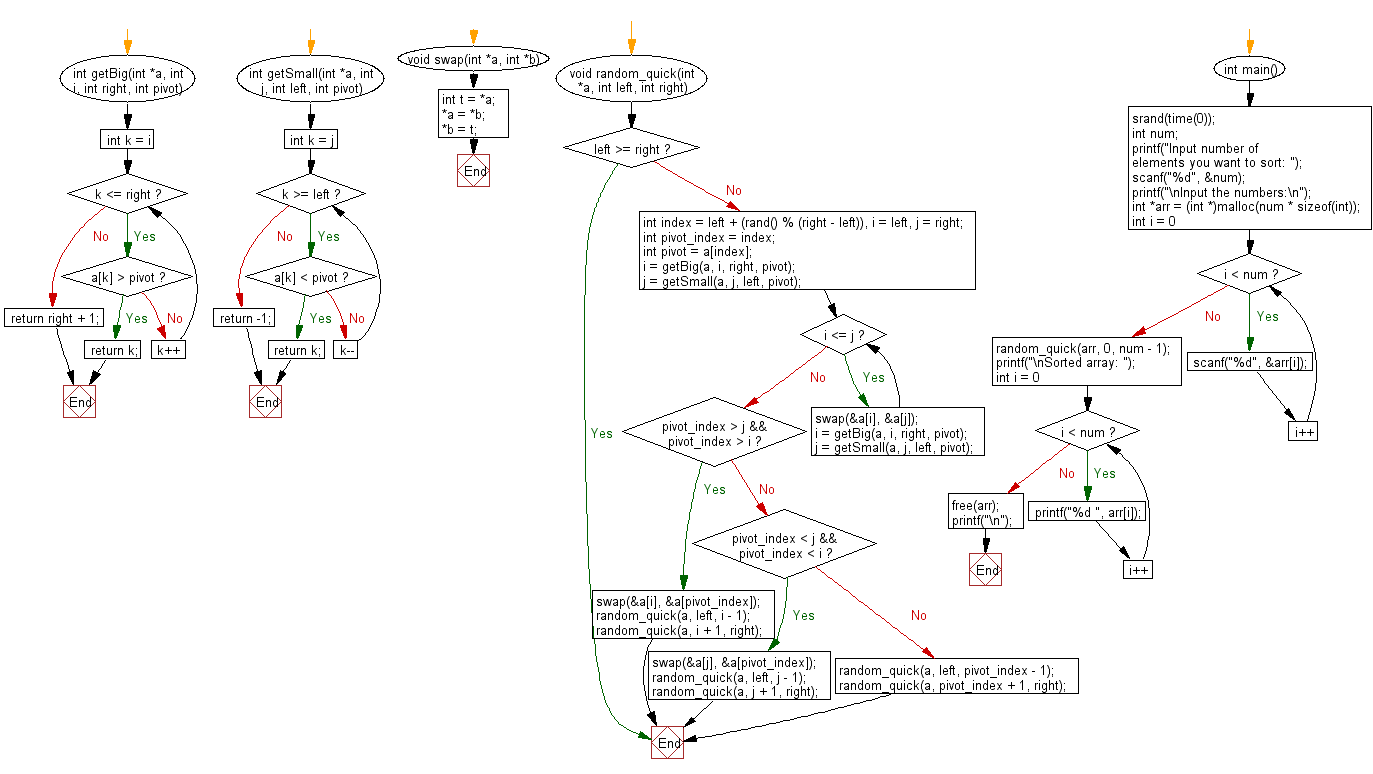C Exercises: Sort numbers using Randomised quick sort method
19. Randomised Quick Sort Variants
Write a C program that sorts numbers using the Randomised quick sort method.
From Wikipedia:
A simple example is randomized QuickSort, where the pivot is chosen randomly, and divides the elements into three partitions: elements less than pivot, elements equal to pivot, and elements greater than pivot. The randomized QuickSort require a lot of resources but always generate the sorted array as an output.
It is obvious that QuickSort always generates the solution which in this case the sorted array. Unfortunately, the time complexity is not that obvious. It turns out that the running time depends on which element we pick as a pivot.
Sample Solution:
Sample C Code:
// Source: https://bit.ly/325j5aY
# include <stdio.h>
#include <stdlib.h>
#include <time.h>
// Function to find the first element greater than pivot
int getBig(int *a, int i, int right, int pivot) {
for (int k = i; k <= right; k++) {
if (a[k] > pivot)
return k;
}
return right + 1;
}
// Function to find the first element smaller than pivot
int getSmall(int *a, int j, int left, int pivot) {
for (int k = j; k >= left; k--) {
if (a[k] < pivot)
return k;
}
return -1;
}
// Function to swap two elements
void swap(int *a, int *b) {
int t = *a;
*a = *b;
*b = t;
}
// Function to perform random quicksort
void random_quick(int *a, int left, int right) {
// Base case: if the array has one or zero elements, it is already sorted
if (left >= right)
return;
// Choose a random pivot element
int index = left + (rand() % (right - left));
int i = left, j = right;
int pivot_index = index;
int pivot = a[index];
// Find the index of the first element greater than pivot from the left
i = getBig(a, i, right, pivot);
// Find the index of the first element smaller than pivot from the right
j = getSmall(a, j, left, pivot);
// Partition the array into elements smaller and greater than the pivot
while (i <= j) {
swap(&a[i], &a[j]);
i = getBig(a, i, right, pivot);
j = getSmall(a, j, left, pivot);
}
// After partitioning, three cases are possible based on the pivot_index
if (pivot_index > j && pivot_index > i) {
// Case 1: Pivot index is greater than both i and j
swap(&a[i], &a[pivot_index]);
random_quick(a, left, i - 1);
random_quick(a, i + 1, right);
} else if (pivot_index < j && pivot_index < i) {
// Case 2: Pivot index is smaller than both i and j
swap(&a[j], &a[pivot_index]);
random_quick(a, left, j - 1);
random_quick(a, j + 1, right);
} else {
// Case 3: Pivot element is at its original position
random_quick(a, left, pivot_index - 1);
random_quick(a, pivot_index + 1, right);
}
}
// Main function
int main() {
srand(time(0));
int num;
// Input the number of elements
printf("Input number of elements you want to sort: ");
scanf("%d", &num);
// Check if there is at least one element
if (num >= 1) {
printf("\nInput the numbers:\n");
// Input the array elements
int *arr = (int *)malloc(num * sizeof(int));
for (int i = 0; i < num; i++) {
scanf("%d", &arr[i]);
}
// Call the random_quick function to sort the array
random_quick(arr, 0, num - 1);
// Display the sorted array
printf("\nSorted array: ");
for (int i = 0; i < num; i++) {
printf("%d ", arr[i]);
}
// Free the dynamically allocated memory
free(arr);
}
printf("\n");
return 0;
}
Sample Output:
Input number of elements you want to sort: 5 Input the numbers: 10 20 30 40 50 60 70 80 90 Sorted array: 10 20 30 40 50 -------------------------------- Process exited after 25.93 seconds with return value 0 Press any key to continue . . .
Flowchart:

For more Practice: Solve these Related Problems:
- Write a C program to implement randomized quick sort and count the number of random pivot selections made.
- Write a C program to sort an array using randomized quick sort and verify the sorted order using binary search.
- Write a C program to implement randomized quick sort on an array of floating-point numbers and display the pivot history.
- Write a C program to compare randomized quick sort with standard quick sort on the same unsorted array.
Go to:
PREV : Stooge Sort Variants.
NEXT : Pigeonhole Sort Variants.
C Programming Code Editor:
Have another way to solve this solution? Contribute your code (and comments) through Disqus.
What is the difficulty level of this exercise?
Test your Programming skills with w3resource's quiz.
